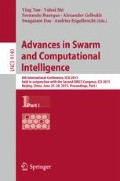Abstract
Continuous opinion dynamics optimizer (CODO) is an algorithm based on human collective opinion formation process for solving continuous optimization problems. In this paper, we have studied the impact of topology and introduction of leaders in the society on the optimization performance of CODO. We have introduced three new variants of CODO and studied the efficacy of algorithms on several benchmark functions. Experimentation demonstrates that scale free CODO performs significantly better than all algorithms. Also, the role played by individuals with different degrees during the optimization process is studied.
Access this chapter
Tax calculation will be finalised at checkout
Purchases are for personal use only
Preview
Unable to display preview. Download preview PDF.
References
Castellano, C., Fortunato, S., Loreto, V.: Statistical physics of social dynamics. Rev. Mod. Phys. 81, 591 (2009)
Deffuant, G., Neau, D., Amblard, F., Weisbuch, G.: Mixing beliefs among interacting agents. Adv. Complex Syst. 3, 87–98 (2000)
Hegselmann, R., Krause, U.: Opinion dynamics driven by various ways of averaging. Comput. Econ. 25, 381–405 (2005)
Lorenz, J., Rauhut, H., Schweitzer, F., Helbing, D.: How social influence can undermine the wisdom of crowd effect. Proc. Natl. Acad. Sci. 108, 9020–9025 (2011)
Kaur, R., Kumar, R., Gulati, A., Ghanshyam, C., Kapur, P., Bhondekar, A.P.: Enhancing electronic nose performance: a novel feature selection approach using dynamic social impact theory and moving window time slicing for classification of Kangra orthodox black tea (Camellia sinensis(L.) O. Kuntze). Sensors Actuators B Chem. 166-167, 309–319 (2012)
Bhondekar, A.P., Kaur, R., Kumar, R., Vig, R., Kapur, P.: A novel approach using Dynamic Social Impact Theory for optimization of impedance-Tongue (iTongue). Chemom. Intell. Lab. Syst. 109, 65–76 (2011)
Macaš, M., Bhondekar, A.P., Kumar, R., Kaur, R., Kuzilek, J., Gerla, V., Lhotská, L., Kapur, P.: Binary social impact theory based optimization and its applications in pattern recognition. Neurocomputing 132, 85–96 (2014)
Kaur, R., Kumar, R., Bhondekar, A.P., Kapur, P.: Human opinion dynamics: An inspiration to solve complex optimization problems. Sci. Rep. 3 (2013)
Mäs, M., Flache, A., Helbing, D.: Individualization as driving force of clustering phenomena in humans. PLoS Comput. Biol. 6, e1000959 (2010)
Liang, J.J., Qu, B.Y., Suganthan, P.N.: Problem Definitions and Evaluation Criteria for the CEC 2013 Special Session on Real-Parameter Optimization (2013)
Liu, C., Du, W.-B., Wang, W.-X.: Particle Swarm Optimization with Scale-Free Interactions. PLoS One. 9, e97822 (2014)
Zhang, C., Yi, Z.: Scale-free fully informed particle swarm optimization algorithm. Inf. Sci. (Ny) 181, 4550–4568 (2011)
Kennedy, J., Mendes, R.: Population structure and particle swarm performance. In: Proc. IEEE Congr. Evol. Comput., pp. 1671–1676. IEEE computer Society, Honolulu
Mendes, R., Kennedy, J., Neves, J.: The fully informed particle swarm: simpler, maybe better. Evol. Comput. IEEE Trans. 8, 204–210 (2004)
Toscano-Pulido, G., Reyes-Medina, A.J., Ramírez-Torres, J.G.: A statistical study of the effects of neighborhood topologies in particle swarm optimization. In: Madani, K., Correia, A.D., Rosa, A., Filipe, J. (eds.) Computational Intelligence. SCI, vol. 343, pp. 179–192. Springer, Heidelberg (2011)
Kurmyshev, E., Juárez, H.A.: What is a leader of opinion formation in bounded confidence models? arXiv Prepr. arXiv1305.4677 (2013)
Düring, B., Markowich, P., Pietschmann, J.F., Wolfram, M.T.: Boltzmann and Fokker-Planck equations modelling opinion formation in the presence of strong leaders. Proc. R. Soc. A Math. Phys. Eng. Sci. 465, 3687–3707 (2009)
Barabási, A.-L., Albert, R.: Emergence of scaling in random networks. Science (80-. ). 286, 509–512 (1999)
Bianconi, G., Barabási, A.-L.: Competition and multiscaling in evolving networks. EPL (Europhysics Lett.) 54, 436 (2001)
Bratton, D., Kennedy, J.: Defining a standard for particle swarm optimization. In: IEEE Swarm Intelligence Symposium, SIS 2007, pp. 120–127. IEEE (2007)
García, S., Molina, D., Lozano, M., Herrera, F.: A study on the use of non-parametric tests for analyzing the evolutionary algorithms’ behaviour: a case study on the CEC 2005 special session on real parameter optimization. J. Heuristics. 15, 617–644 (2009)
Author information
Authors and Affiliations
Corresponding author
Editor information
Editors and Affiliations
Rights and permissions
Copyright information
© 2015 Springer International Publishing Switzerland
About this paper
Cite this paper
Kaur, R., Kumar, R., Bhondekar, A.P., Suzuki, R., Arita, T. (2015). Effects of Topological Variations on Opinion Dynamics Optimizer. In: Tan, Y., Shi, Y., Buarque, F., Gelbukh, A., Das, S., Engelbrecht, A. (eds) Advances in Swarm and Computational Intelligence. ICSI 2015. Lecture Notes in Computer Science(), vol 9140. Springer, Cham. https://doi.org/10.1007/978-3-319-20466-6_1
Download citation
DOI: https://doi.org/10.1007/978-3-319-20466-6_1
Published:
Publisher Name: Springer, Cham
Print ISBN: 978-3-319-20465-9
Online ISBN: 978-3-319-20466-6
eBook Packages: Computer ScienceComputer Science (R0)

